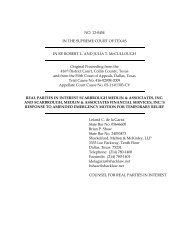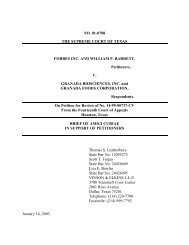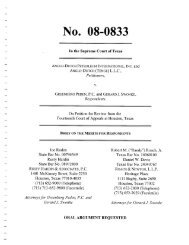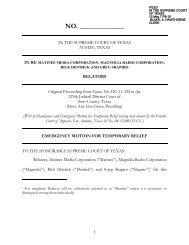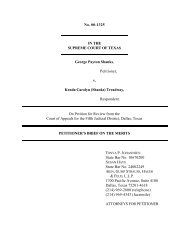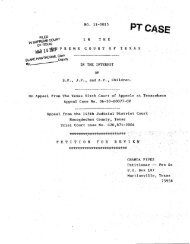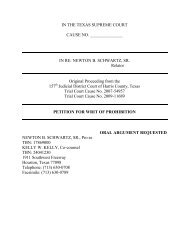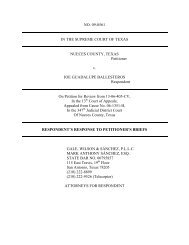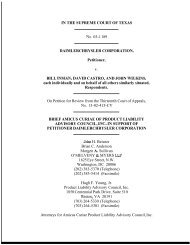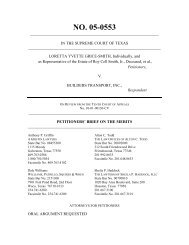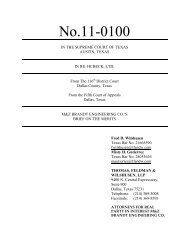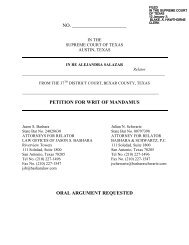NO. 10-0859 - Supreme Court of Texas
NO. 10-0859 - Supreme Court of Texas
NO. 10-0859 - Supreme Court of Texas
You also want an ePaper? Increase the reach of your titles
YUMPU automatically turns print PDFs into web optimized ePapers that Google loves.
Page 6<br />
Not Reported in S.W.3d, 20<strong>10</strong> WL 2789649 (Tex.App.-Austin)<br />
(Cite as: 20<strong>10</strong> WL 2789649 (Tex.App.-Austin))<br />
adjudicated delinquent. This type <strong>of</strong> claim is known<br />
as a “bare” innocence or Herrera-type claim-it is<br />
predicated not on the existence <strong>of</strong> any constitutional<br />
defect in the trial process that yielded a defendant's<br />
conviction, but on the claim that the defendant is actually<br />
innocent, as demonstrated by new evidence<br />
discovered or made available since trial. See Herrera<br />
v. Collins, 506 U.S. 390, 113 S.Ct. 853, 122 L.Ed.2d<br />
203 (1993); Ex parte Franklin, 72 S.W.3d 671, 675<br />
(Tex.Crim.App.2002) (citing Schlup v. Delo, 513<br />
U.S. 298, 314, 115 S.Ct. 851, 130 L.Ed.2d 808<br />
(1995); Ex parte Elizondo, 947 S.W.2d 202, 208<br />
(Tex.Crim.App.1996)). Because the incarceration <strong>of</strong><br />
a truly innocent person would in itself violate due<br />
process, actual innocence is an independent ground<br />
for habeas corpus relief under those circumstances.<br />
See Elizondo, 947 S.W.2d at 204-05.<br />
A bare innocence claim turns not on whether the<br />
jury's verdict was valid, but on whether the new evidence<br />
would have convinced the jury <strong>of</strong> the applicant's<br />
innocence. See id. at 207, 209. “[T]he court<br />
charged with deciding such a claim should make a<br />
case-by-case determination about the reliability <strong>of</strong> the<br />
newly discovered evidence under the circumstances,<br />
... then should weigh the evidence in favor <strong>of</strong> the [applicant]<br />
against the evidence <strong>of</strong> his guilt” adduced at<br />
trial, id. at 207 (quoting Herrera, 506 U.S. at 244<br />
(Blackmun, J., dissenting)), and “assess the probable<br />
impact <strong>of</strong> the newly available evidence upon the persuasiveness<br />
<strong>of</strong> the State's case as a whole.” Id. at 206.<br />
Ultimately, the applicant must meet the “extraordinarily<br />
high” burden <strong>of</strong> proving “by clear and convincing<br />
evidence that no reasonable juror would have<br />
convicted him in light <strong>of</strong> the new evidence.” See id.<br />
at 209.<br />
M.P.A. argues that he presented “new evidence” that<br />
established, by clear and convincing evidence, that he<br />
never sexually assaulted S.A. This evidence may be<br />
summarized as falling into essentially three categories.<br />
First, M.P.A. has relied on subsequent recantations<br />
<strong>of</strong> both S.A. and A.A.-both now deny ever being<br />
sexually abused by either cousin. They explain<br />
their earlier accusations against M.P.A. and J.W.A. as<br />
the product <strong>of</strong> manipulation by their mother,<br />
LaVonna. With this testimony, M.P.A. presented,<br />
second, evidence that LaVonna had the motive and<br />
capacity to fabricate false sexual-assault allegations<br />
by her children as a means <strong>of</strong> gaining advantage in<br />
her custody battle with Stephan, with whom the children<br />
had been living at the time <strong>of</strong> the alleged incidents.<br />
Third, M.P.A. relies on what he terms “an<br />
enormous amount <strong>of</strong> evidence corroborating the recantations,”<br />
including evidence regarding the timing<br />
<strong>of</strong> the children's alleged outcries (or absence there<strong>of</strong>)<br />
compared to events in LaVonna's divorce and custody<br />
battles with Stephan, LaVonna's potential involvement<br />
in inducing or encouraging the outcries,<br />
and medical evidence.<br />
*7 S.A. testified at both the bill-<strong>of</strong>-review hearing<br />
and the habeas hearing. At the time <strong>of</strong> the bill-<strong>of</strong>review<br />
hearing, S.A. was age eleven and living with<br />
Stephan and A.A. After receiving warnings from the<br />
juvenile court regarding the implications <strong>of</strong> providing<br />
perjured testimony, S.A. testified that her prior testimony<br />
at M.P.A .'s trial had not been true, that “my<br />
mom [LaVonna] told me to say those things” and that<br />
LaVonna would go to jail if she did not. Later, at the<br />
habeas hearing before the district court, S.A., now<br />
within a few days <strong>of</strong> her eighteenth birthday, elaborated<br />
that LaVonna first began insisting that she accuse<br />
her cousins <strong>of</strong> sexually assaulting her while in<br />
Florida, after LaVonna had fled <strong>Texas</strong> with the children<br />
in violation <strong>of</strong> a court order, and that LaVonna<br />
told her that this was necessary to keep LaVonna out<br />
<strong>of</strong> jail. S.A. acknowledged that when she traveled to<br />
<strong>Texas</strong> to testify in M.P.A.'s trial, she had been accompanied<br />
by her maternal grandmother while<br />
LaVonna had remained in Iowa. While LaVonna had<br />
not been physically present to influence her, S.A.<br />
insisted that, nonetheless, “when I go home I'm going<br />
home to my mom.”<br />
A.A. also testified during the habeas hearing. He denied<br />
that either cousin had sexually assaulted him.<br />
A.A. testified to a conversation with LaVonna, his<br />
maternal grandmother, and S.A. after they had moved<br />
to Iowa when he was six or seven years old. According<br />
to A.A., LaVonna told him to say that his cousins<br />
had sexually assaulted him. A.A. claimed he complied<br />
and later testified against M.P.A. at trial despite<br />
his reservations that “this isn't really true” because he<br />
thought “I shouldn't question my mother, you know,<br />
because she is my mother and she's got wisdom.”<br />
M.P.A. presented evidence during both hearings<br />
tending to show that LaVonna had a poor propensity<br />
for truthfulness, a pattern <strong>of</strong> using abuse allegations<br />
to gain leverage in domestic disputes, including her<br />
disputes with Stephan, and that the timing <strong>of</strong> these<br />
© 20<strong>10</strong> Thomson Reuters. No Claim to Orig. US Gov. Works.



